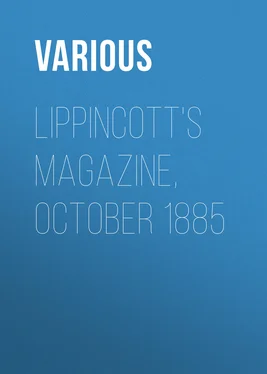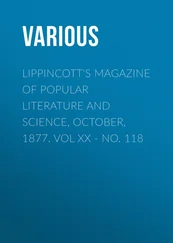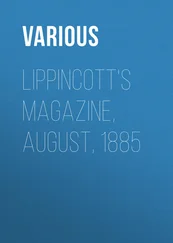Various - Lippincott's Magazine, October 1885
Здесь есть возможность читать онлайн «Various - Lippincott's Magazine, October 1885» — ознакомительный отрывок электронной книги совершенно бесплатно, а после прочтения отрывка купить полную версию. В некоторых случаях можно слушать аудио, скачать через торрент в формате fb2 и присутствует краткое содержание. Издательство: Иностранный паблик, Жанр: foreign_antique, periodic, foreign_edu, на английском языке. Описание произведения, (предисловие) а так же отзывы посетителей доступны на портале библиотеки ЛибКат.
- Название:Lippincott's Magazine, October 1885
- Автор:
- Издательство:Иностранный паблик
- Жанр:
- Год:неизвестен
- ISBN:нет данных
- Рейтинг книги:4 / 5. Голосов: 1
-
Избранное:Добавить в избранное
- Отзывы:
-
Ваша оценка:
- 80
- 1
- 2
- 3
- 4
- 5
Lippincott's Magazine, October 1885: краткое содержание, описание и аннотация
Предлагаем к чтению аннотацию, описание, краткое содержание или предисловие (зависит от того, что написал сам автор книги «Lippincott's Magazine, October 1885»). Если вы не нашли необходимую информацию о книге — напишите в комментариях, мы постараемся отыскать её.
Lippincott's Magazine, October 1885 — читать онлайн ознакомительный отрывок
Ниже представлен текст книги, разбитый по страницам. Система сохранения места последней прочитанной страницы, позволяет с удобством читать онлайн бесплатно книгу «Lippincott's Magazine, October 1885», без необходимости каждый раз заново искать на чём Вы остановились. Поставьте закладку, и сможете в любой момент перейти на страницу, на которой закончили чтение.
Интервал:
Закладка:
And now that Juddson and Tarbell were moving to their new offices, who should also at the very same time become a tenant of the Land and Water Insurance Company but the Honorable Franklin Blood Pope? The Land and Water Company's new building was in a very desirable locality, and several lawyers deserted their old nooks and corners to occupy its spacious and well-calcimined apartments. Juddson and Tarbell took the rooms on the back of the third floor, Mr. Pope those on the front ditto: they were very near neighbors. In former days Mrs. Tarbell had often complained to her husband of Mr. Pope's success. It was an argument that men had not as much common sense as they pretended to have, she said, or else they would see through Franklin B–'s absurd pretensions. "Even I can perceive that the man is a humbug," she continued. "In fact, any woman could. Why is he successful, then? Why has he an enormous practice? Why has he been sent to Congress? If it is because he has a majestic appearance and can talk a great deal, women certainly can fulfill these conditions, and that by your own account of them."
To which Mr. Tarbell would answer, "Exactly, my love, by all means; and so is your friend Mrs. Pegley a great talker, and a fine-looking woman."
"Then give her all the rights you give to Mr. Pope," cried Mrs. Tarbell.
"She shall have 'em, and welcome," said Tarbell; but he did not tell his wife that he had voted for Mr. Pope on the opposition ticket, and had even consulted him on matters of business,—once going so far as to suggest to him that a certain proposed alteration in the tariff would seriously affect the mourning-goods industry,—from which it may be gathered that it was not from any lack of prudence that Mr. Tarbell died a bankrupt and left his widow to become a lady-lawyer.
Mr. Pope himself it was who betrayed Mr. Tarbell's confidence and opened Mrs. Tarbell's eyes. "Your husband was my very good friend, my dear madam," said the Honorable Franklin, "and I was proud to call him my client. Yes, I had the honor of advising him in several matters and of carrying through some rather delicate negotiations for him. A man of the strictest integrity, ever genial and urbane, of sound judgment and independent views, endowed with strong common sense and quick perceptions. You see, I had the highest opinion of Mr. Tarbell, and have often wished to tell his widow—alas that I should have to call her so!—how certain I am that she will succeed in the career she has chosen, and how deeply I grieve that her husband could not have lived to find in her a better adviser than I ever could have been to him."
Messrs.—I mean Mrs. and Mr.—Tarbell and Juddson were just moving into their new offices when Mr. Pope uttered these kind wishes. He met Mrs. Tarbell on the door-step: he was standing there, indeed, when she came in. He was always standing on the door-step: he carried on most of his business, especially with the politicians, in public. "I beg that you will use my library on all occasions," he continued, raising his voice a little. "If I may say so myself, it is rather comprehensive; in fact, I am very proud of it. And any assistance which I can give you in any way, my dear madam, will, I need hardly say, be given most heartily."
Use his library, indeed! Mrs. Tarbell would have been as likely to go to the Vatican and ask Pope Leo for the loan of a few works contra hæreticos . Why had she and her brother ever come to the Land and Water Company's building? The idea of meeting the Honorable Pope every day, of every day beholding his portly figure, statesman-like features, and lion mane, and acknowledging his bland bows and salutations, was inexpressibly odious. And, what was worse, Mr. Pope continued to flourish like a green bay-tree, or like the proprietors of a patent medicine or a blackguard newspaper, or any other comparison you please. Feet tramped along the hall, hands knocked at his door, lips innumerable whispered into his ears, and Mrs. Tarbell sat and looked at her sign, wondering what had become of all the women who were to have employed her. She had not said, "Walk in, madam," to one of them; and Mr. Juddson's clients all regarded her as if she were a curiosity.
Mrs. Tarbell looked, in fact, like the president of a Dorcas society or a visitor of a church hospital. She had pleasing features, dark hair, slightly touched with gray, as became a lawyer of thirty-five, and dignified manners. She dressed very plainly in a black dress with just one row of broad trimming down the front, and, though she felt that it was an abuse of authority, she drew her hair straight back from her forehead. This question of her hair had given her some little anxiety, and it had cost her some time to decide what kind of hat or bonnet she should wear. Alexander said she might use her riding-hat for the sake of economy, but she had decided on a tweed walking-hat, which could be taken off very quickly in the court-room. For, whatever she might do in church, it was now impossible for her to remain covered before the bench of judges.
Mrs. Tarbell's desk was in the middle of the back room,—she could just see the outer door obliquely through that of her partition,—and Mr. Juddson's was in a similar position in the front room. This was not a very good arrangement. Mrs. Tarbell could not very well be put in the front room with the office-boy, and yet the proximity of the office-boy was not agreeable to Mr. Juddson either. Then, too, most of the books were in the back room, and so was the sofa: altogether it looked as if Mrs. Tarbell were the senior. Mr. Juddson was thinking seriously of having another partition built, and that would at any rate save him from being asked "if Mr. Juddson were in," for, as every one knows, there is a vast difference between being asked "if Mr. Juddson be in," and "is this Mr. Juddson?" But Mr. Juddson had the picture of Chief-Justice Marshall and the map of the battle-field of Gettysburg, so he was not so badly off; and Mrs. Tarbell was very comfortable.
She was just musing over her future, and saying to herself, "When I die, I know that they will call a bar-meeting, and that Mr. Pope will make a eulogy on my character," when the door opened, and Mr. Juddson came in. Mrs. Tarbell returned to business-life immediately.
"Did you find Mullany?" she said.
Mr. Juddson, a tall, black-whiskered man of about fifty, rubbed his hands for a moment over the fire, and then answered shortly that he had found Mullany.
"What did he say?"
"Oh,—what I expected," said Mr. Juddson, turning over the papers on his table. He disliked unnecessary questions. Mrs. Tarbell had no interest in Mullany, and the most she ought to do was to ask about him in an off-hand way in the street-car on the way home. Mr. Juddson discovered the paper for which he was searching, and turned toward the door.
"Are you going out?" said Mrs. Tarbell.
The door was already half open.
"Reference before Murray. Back at one," was all Mr. Juddson deigned to say.
"Alexander!" cried Mrs. Tarbell,—when the office-boy was in, she called her brother Mr. Juddson,—"Alexander!"
" Well ?" said Mr. Juddson. He was late as it was.
"You will make the office very cold if you leave the door—but never mind. Don't let me keep you. I only wanted to tell you that I should like to talk to you about something some time to-d—" The rest of the sentence was lost upon Mr. Juddson, who had already shut the door behind him, and Mrs. Tarbell felt aggrieved.
So much aggrieved, in fact, that she found it impossible to return to the law-journal.
"I suppose I need a sedative," she said to herself. "If I were a man, I would put my feet up on the table and light a cigar, or—no! I would never practise that vilest form of the vice." (What she meant by this last phrase I cannot imagine, unless she referred to something which Mr. Juddson had been driven to do because he could not very well smoke while his sister was in the office.) "What," continued Mrs. Tarbell, "what can there be to recommend the position?" She looked at the desk.
Читать дальшеИнтервал:
Закладка:
Похожие книги на «Lippincott's Magazine, October 1885»
Представляем Вашему вниманию похожие книги на «Lippincott's Magazine, October 1885» списком для выбора. Мы отобрали схожую по названию и смыслу литературу в надежде предоставить читателям больше вариантов отыскать новые, интересные, ещё непрочитанные произведения.
Обсуждение, отзывы о книге «Lippincott's Magazine, October 1885» и просто собственные мнения читателей. Оставьте ваши комментарии, напишите, что Вы думаете о произведении, его смысле или главных героях. Укажите что конкретно понравилось, а что нет, и почему Вы так считаете.












